- By Javeria
- January 10, 2024


When it comes to your online presence, the right web host can make all the difference. From small businesses to large enterprises, the quality of your web host can impact user experience and performance. So, which providers stand out from the crowd? Bluehost, HostGator, SiteGround, and InMotion Hosting are some of the top web hosting service providers known for their reliability and expertise.
But with so many top web hosting service providers out there, it can be hard to know which one is right for you. To make things easier, we’ve done the work for you and researched the top 11+ best web hosting services of 2023. From shared hosting to cloud server options, we’ve got you covered with everything you need to know about finding the perfect provider for your needs. So if you’re ready to get ahead in 2023, let’s dive into our list!
When it comes to choosing a web host, you want one that will provide you with reliable, secure and fast service—and that’s before even thinking about the price.
It’s important to evaluate all the hosting services for the features they provide, as well as their overall value for money. Here are some of the key criteria that you should consider when selecting a web hosting service:
Nowadays, there are so many varieties of web hosting services, it can be hard to keep them all straight! Here’s a quick crash course on the wide variety of services that are available. To start with, there are shared hosting services, which allow you to share one server with other websites and split the costs. Then there’s dedicated hosting which is more pricey but allows for much better control and security as you’re renting an entire server for your website alone.
Next up is virtual private servers (VPS) which provide root access and greater control than shared hosting but at a more affordable cost than dedicated hosting. And finally, cloud hosting offers the greatest scalability and flexibility as it allows you to easily upgrade or downgrade depending on demand.
No matter what kind of website you plan on creating, chances are there’s a web host out there that can serve your needs perfectly!

Nexcess is ideal for those businesses that want to manage their WordPress hosting most efficiently. For ecommerce businesses that run on this platform (and also want to scale), Nexcess is the #1 solution to go for.
Best For
Overall Web Hosting
Price
$13.30/mo-$699.30/mo
Annual Discount
Yes – 2 Months Free
Promotion
Nexcess is a web hosting platform that offers a range of hosting solutions to businesses of all sizes. It was founded in 2000 and has since grown to become one of the most popular hosting providers on the market.
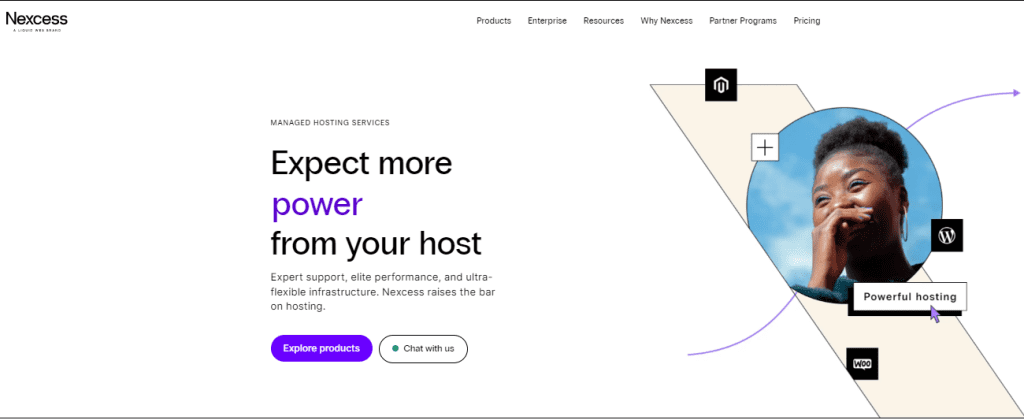
One of the biggest benefits of Nexcess is its reliability. The platform uses state-of-the-art technology and infrastructure to ensure that your website is always up and running, even during times of high traffic or server strain. This means that you can trust Nexcess to keep your website online and accessible to your customers at all times.
In addition to reliability, Nexcess also offers a range of features that make it a great choice for businesses. For example, it offers automatic backups, so you can rest assured that your data is always safe and secure. It also offers easy scalability, so you can quickly and easily upgrade your hosting plan as your business grows.
When it comes to pricing, Nexcess offers a variety of plans to suit different budgets and needs. Its plans start at just $19 per month and go up to $449.55 per month, depending on the level of hosting and resources you need. Each plan comes with a range of features and benefits, so you can choose the plan that best fits your business.

As for why Nexcess might suit your business, it really depends on your specific needs. However, if you’re looking for a reliable hosting platform with a range of features and pricing options, Nexcess could be a great choice. Its scalable plans mean that you can start small and upgrade as your business grows, which is ideal for many businesses that are just starting out. Additionally, its automatic backups and other security features mean that your website and data will always be safe and secure.

WP Engine is a great hosting solution for any business looking to get more out of their WordPress site. With added protection options custom-built for WordPress environments, WP Engine guarantees your WordPress sites stay secure and running at their best. They also offer the possibility of effortless scalability on demand across cloud platforms.
Best For
Enterprise Hosting
Price
$24/mo-$600/mo
Annual Discount
Yes – 4 Months Free
Promotion
Absolutely! WP Engine is a web hosting platform that specializes in WordPress hosting. It was founded in 2010 and has since become one of the most popular WordPress hosting providers on the market.
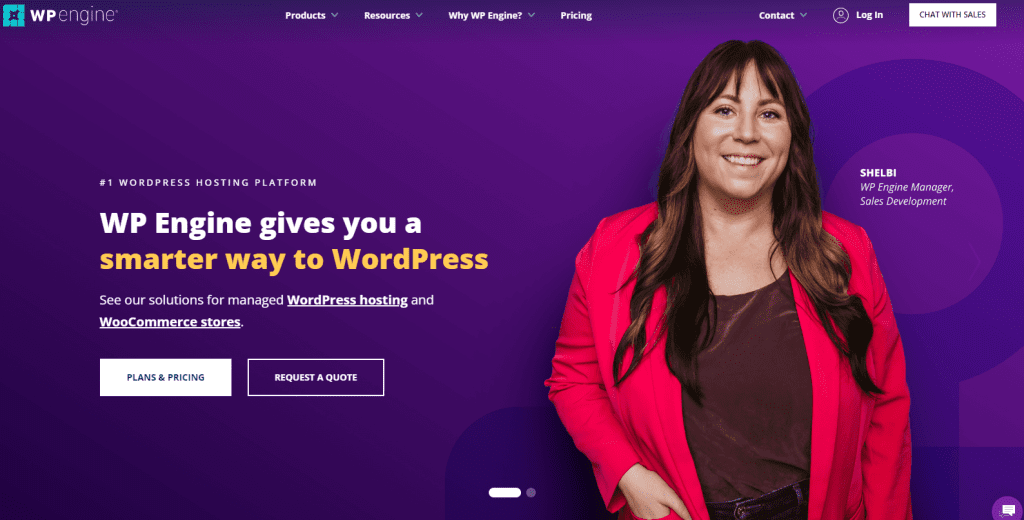
One of the biggest benefits of WP Engine is its focus on WordPress. Because WP Engine is specifically designed for WordPress, it offers a range of features that are tailored to WordPress users. For example, it offers automatic updates for WordPress, so you don’t have to worry about keeping your website up to date. It also offers a range of plugins and themes that are optimized for WordPress, so you can easily add functionality and style to your website.
Another benefit of WP Engine is its reliability. The platform uses state-of-the-art technology and infrastructure to ensure that your website is always up and running. It offers fast load times, which can help improve your website’s search engine rankings and user experience. It also offers automatic backups and disaster recovery, so you can rest assured that your website and data are always safe and secure.
Pricing Plan, WP Engine offers a variety of plans to suit different budgets and needs. Its plans start at $30 per month and go up to $290 per month, depending on the level of hosting and resources you need. Each plan comes with a range of features and benefits, including access to WP Engine’s content delivery network (CDN), which can help improve your website’s load times.

As for why WP Engine might suit your business, it really depends on your specific needs. However, if you’re looking for a reliable hosting platform that is specifically tailored to WordPress users, WP Engine could be a great choice. Its focus on WordPress means that it offers a range of features and benefits that are optimized for WordPress users, and its pricing plans mean that you can choose the plan that best fits your budget and needs. Additionally, its reliability and security features mean that your website and data will always be safe and secure.

Bluehost is our top pick for those who want a tailored solution to their business needs. Whether you run a website, blog, or online store, you will find what you need at Bluehost.
Best For
Tailored Plans
Price
$4.95/mo-$13.95/mo
Annual Discount
No
Promotion
Bluehost is a web hosting platform that offers a range of hosting solutions to businesses of all sizes. It was founded in 2003 and has since grown to become one of the most popular hosting providers on the market.

One of the biggest benefits of Bluehost is its ease of use. The platform is designed to be user-friendly, even for beginners. It offers a range of tools and features that make it easy to set up and manage your website, including a one-click WordPress installation and a drag-and-drop website builder. This means that you can get your website up and running quickly and easily, even if you don’t have a lot of technical expertise.
Another benefit of Bluehost is its reliability. The platform uses modern technology and infrastructure to ensure that your website is always up and running, even during times of high traffic or server strain. This means that you can trust Bluehost to keep your website online and accessible to your customers at all times.
When it comes to pricing, Bluehost offers a variety of plans to suit different budgets and needs. Its plans start at just $4.95 per month and go up to $13.95 per month, depending on the level of hosting and resources you need. Each plan comes with a range of features and benefits, including a free domain name for the first year and free SSL certificates.
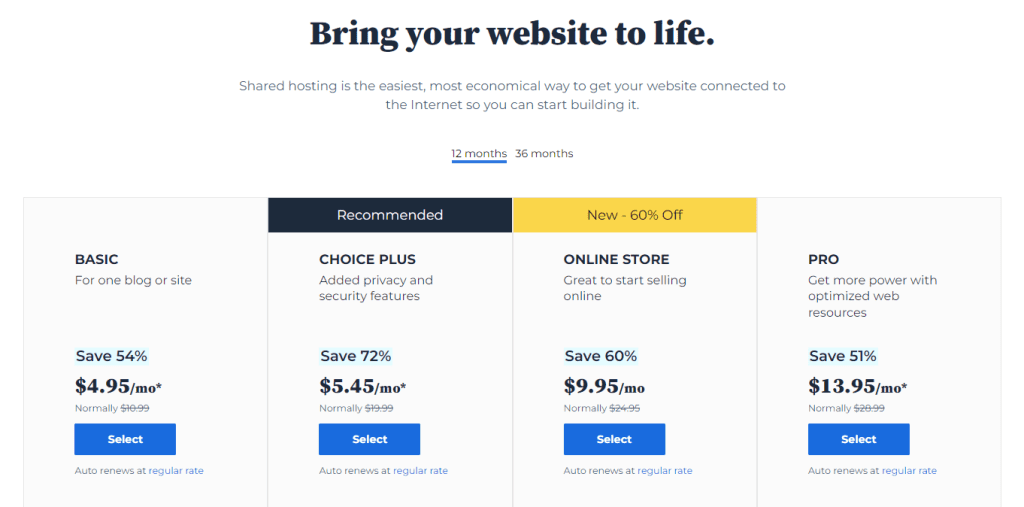
As for why Bluehost might suit your business, it really depends on your specific needs. However, if you’re looking for an easy-to-use hosting platform that offers reliable hosting at an affordable price, Bluehost could be a great choice. Its user-friendly interface means that you can quickly and easily set up and manage your website, even if you don’t have a lot of technical expertise. Its range of plans means that you can choose the plan that best fits your budget and needs, and its reliability means that you can trust Bluehost to keep your website up and running at all times.

Cloudways offer high performance and reliability at an affordable price. Their platform is easy to use, and they provide excellent customer support. With simplicity and flexibility, you’ll still be able to get the performance and features you need without having to overspend.
Best For
Managed Cloud Hosting
Price
$10/mo-$96/mo
Annual Discount
No
Promotion
Cloudways is a cloud-based hosting platform that offers a variety of hosting solutions, including WordPress hosting. It is known for its easy-to-use interface, fast load times, and high levels of security.
Benefits: Cloudways offers a number of benefits to businesses, including scalability, high performance, and automatic backups. Its cloud-based infrastructure allows businesses to easily scale their hosting as their website traffic grows, while its fast load times and high levels of security help ensure that the website is always up and running smoothly. Additionally, Cloudways provides automatic backups, ensuring that businesses can easily recover their website in case of any data loss or other issues.
Pricing plan: Cloudways offers a range of pricing plans, starting at $10 per month for its basic plan. Higher-tier plans offer additional features and increased server resources, with prices scaling accordingly.

Why it suits your business: Cloudways is a good option for businesses that want scalable hosting solutions that can grow with their needs. Its cloud-based infrastructure provides high performance and reliability, while its user-friendly interface makes it easy to manage your hosting. Additionally, Cloudways offers a range of pricing plans to fit businesses of all sizes and budgets.

While Hostinger is excellent for those that want web hosting on a budget, the service is still top quality. You get free features such as SSL and migration, a speed boost for PHP, and even 24/7 tech support. If you’re looking to start a website without spending a fortune, I recommend you check out Hostinger.
Best For
Affordable Hosting
Price
$0.99/mo-$4.99/mo
Annual Discount
No
Promotion
Intro: Hostinger is a web hosting platform that offers affordable hosting plans for businesses of all sizes. It is known for its fast load times, high levels of security, and user-friendly control panel.

Benefits: Hostinger provides businesses with fast load times, high levels of security, and a user-friendly control panel. Its affordable pricing plans make it an attractive option for businesses on a budget, while its high levels of security help ensure that their website is protected against cyber threats. Additionally, Hostinger’s user-friendly control panel makes it easy to manage your hosting and website.
Pricing plan: Hostinger offers a range of pricing plans, starting at just $0.99 per month for its basic plan. Higher-tier plans offer additional features and increased server resources, with prices scaling accordingly.

HostGator is recommended if you’re looking for a proven web host with a guaranteed uptime of 99.9%, ensuring that your website is up and running when anyone tries to access it. I also like HostGator because they offer easy WordPress installation, free SSL certificates, and a free domain for the first year.
HostGator is a web hosting platform that offers a range of hosting solutions, including shared hosting, WordPress hosting, and dedicated hosting. It is known for its 24/7 support, fast load times, and high levels of security.
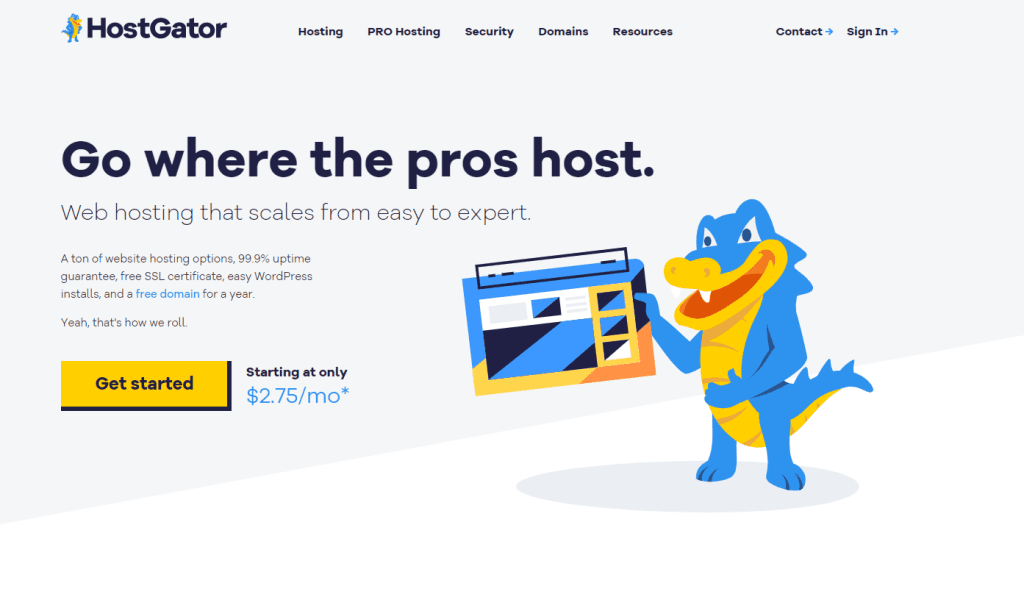
Benefits: HostGator provides businesses with reliable hosting solutions that are backed by 24/7 support. Its fast load times and high levels of security help ensure that businesses’ websites are always up and running smoothly, while its range of hosting options allows businesses to choose the solution that best fits their needs.
Pricing plan: HostGator offers a range of pricing plans, starting at $2.75 per month for its basic plan. Higher-tier plans offer additional features and increased server resources, with prices scaling accordingly.

Why it suits your business: HostGator is a good option for businesses that want reliable hosting solutions with a range of hosting options to choose from. Its 24/7 support ensures that businesses can get help when they need it, while its fast load times and high levels of security help ensure that their website is always up and running smoothly.
GoDaddy is a web hosting platform that offers a range of hosting solutions, including shared hosting, WordPress hosting, and dedicated hosting. It is known for its fast load times, 24/7 support, and user-friendly control panel.

Benefits: GoDaddy offers a number of benefits to businesses, including fast load times, 24/7 support, and a user-friendly control panel. Its hosting solutions are backed by a robust infrastructure that ensures high performance and reliability, while its user-friendly control panel makes it easy to manage your hosting and website.
Pricing plan: GoDaddy offers a range of pricing plans, starting at $4.99 per month for its basic plan. Higher-tier plans offer additional features and increased server resources, with prices scaling accordingly.
Why it suits your business: GoDaddy is a good option for businesses that want reliable hosting solutions with a user-friendly interface. Its range of hosting options allows businesses to choose the solution that best fits their needs, while its 24/7 support ensures that they can get help when they need it.

If you’re environmentally conscious, GreenGeeks is your web hosting solution. With no server wastage when using GreenGeeks, you’ll be doing your part in helping the environment while having a great host to run your website on. In addition, GreekGeeks also plant a tree for each hosting account created, which is a nice touch from their side.
Best For
Green Webhosting
Price
$2.95/mo-$8.95/mo
Annual Discount
No
Promotion
GreenGeeks is a web hosting platform that offers eco-friendly hosting solutions. It is known for its fast load times, high levels of security, and commitment to sustainability.

Benefits: GreenGeeks provides businesses with fast load times, high levels of security, and a commitment to sustainability. Its hosting solutions are powered by renewable energy, making it a good choice for businesses that want to reduce their environmental impact. Additionally, GreenGeeks offers a range of features to help businesses optimize their website’s performance and improve their search engine rankings.
Pricing plan: GreenGeeks offers a range of pricing plans, starting at $2.95 per month for its basic plan. Higher-tier plans offer additional features and increased server resources, with prices scaling accordingly.

Why it suits your business: GreenGeeks is a good option for businesses that want eco-friendly hosting solutions that don’t compromise on performance or security. Its commitment to sustainability makes it a good choice for businesses that want to reduce their environmental impact, while its range of features helps businesses optimize their website’s performance.
Namecheap is a web hosting platform that offers a range of hosting solutions, including shared hosting, WordPress hosting, and VPS hosting. It is known for its affordable pricing plans, fast load times, and high levels of security.
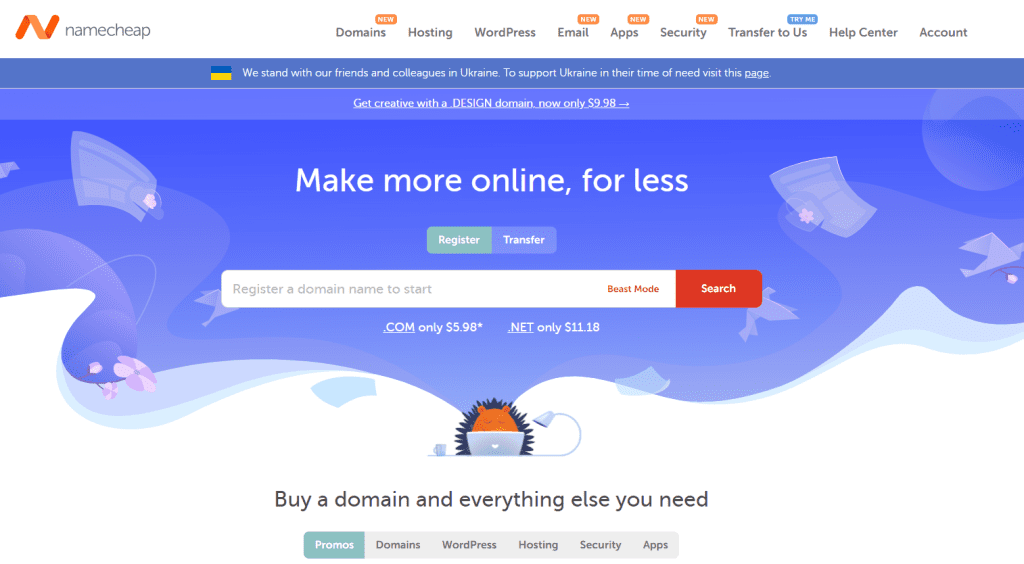
Benefits: Namecheap provides businesses with affordable hosting solutions that offer fast load times and high levels of security. Its range of hosting options allows businesses to choose the solution that best fits their needs, while its user-friendly control panel makes it easy to manage your hosting and website.
Pricing plan: Namecheap offers a range of pricing plans, starting at $1.41 per month for its basic plan. Higher-tier plans offer additional features and increased server resources, with prices scaling accordingly.

Why it suits your business: Namecheap is a good option for businesses that want affordable hosting solutions without sacrificing performance or security. Its range of hosting options allows businesses to choose the solution that best fits their needs, while its user-friendly control panel makes it easy to manage your hosting.

Domain.com is an all-encompassing website solution and the right choice for beginners without much website experience.
Best For
Website Solution For Beginners
Price
$3.75/mo-$13.75/mo
Annual Discount
No
Promotion
Intro: Domain.com is a web hosting platform that offers a range of hosting solutions, including shared hosting, WordPress hosting, and VPS hosting. It is known for its fast load times, high levels of security, and user-friendly interface.
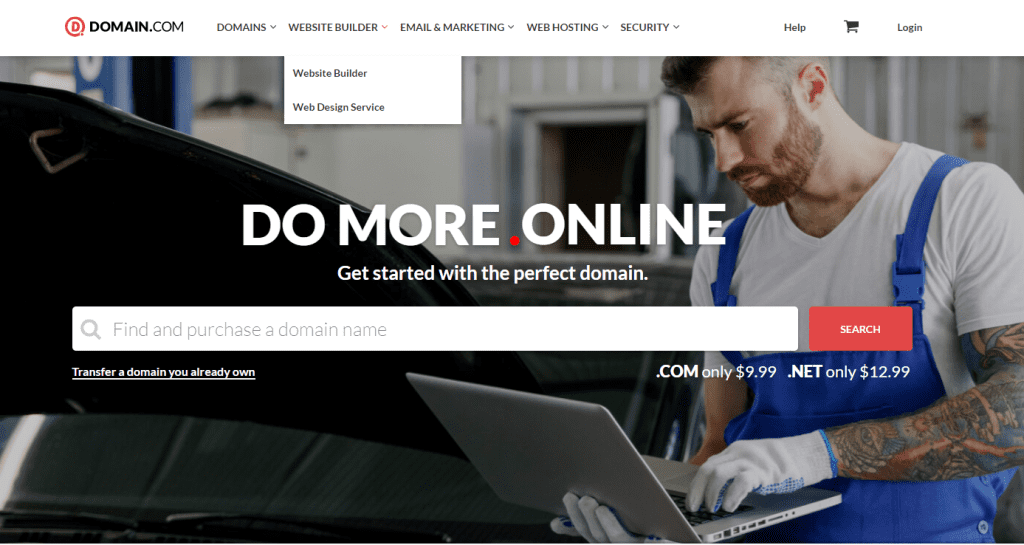
Benefits: Domain.com provides businesses with fast load times, high levels of security, and a user-friendly interface. Its range of hosting options allows businesses to choose the solution that best fits their needs, while its 24/7 support ensures that they can get help when they need it.
Pricing plan: Domain.com offers a range of pricing plans, starting at $3.75 per month for its basic plan. Higher-tier plans offer additional features and increased server resources, with prices scaling accordingly.
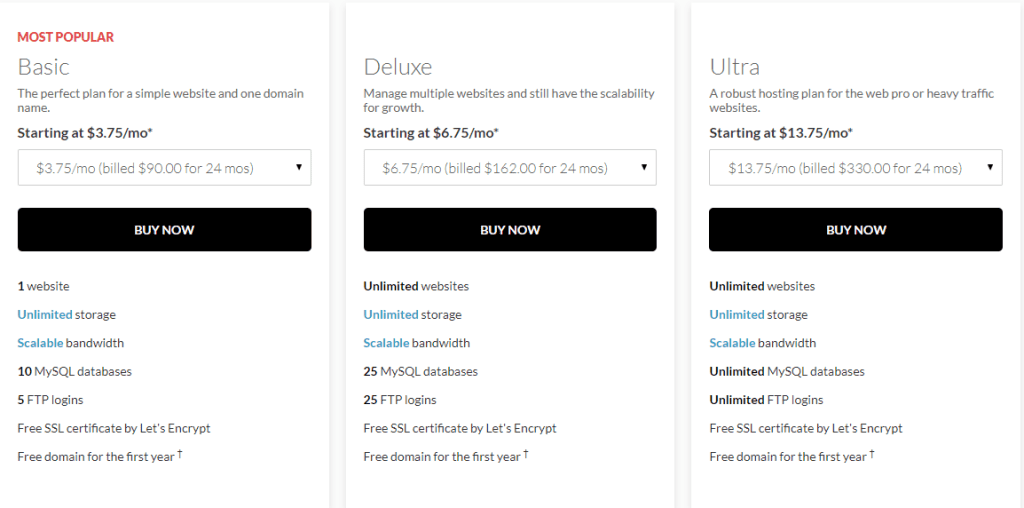
Why it suits your business: Domain.com is a good option for businesses that want reliable hosting solutions with a user-friendly interface. Its range of hosting options allows businesses to choose the solution that best fits their needs, while its 24/7 support ensures that they can get help when they need it. Additionally, Domain.com offers a number of features to help businesses optimize their website’s performance and improve their search engine rankings.
Siteground is a web hosting platform that offers a range of hosting solutions, including shared hosting, WordPress hosting, and cloud hosting. It is known for its fast load times, high levels of security, and excellent customer support.

Benefits: Siteground provides businesses with fast load times, high levels of security, and excellent customer support. Its hosting solutions are optimized for WordPress, making it a good choice for businesses that use this platform. Additionally, Siteground offers a range of features to help businesses optimize their website’s performance and improve their search engine rankings.
Pricing plan: Siteground offers a range of pricing plans, starting at $3.99 per month for its basic plan. Higher-tier plans offer additional features and increased server resources, with prices scaling accordingly.
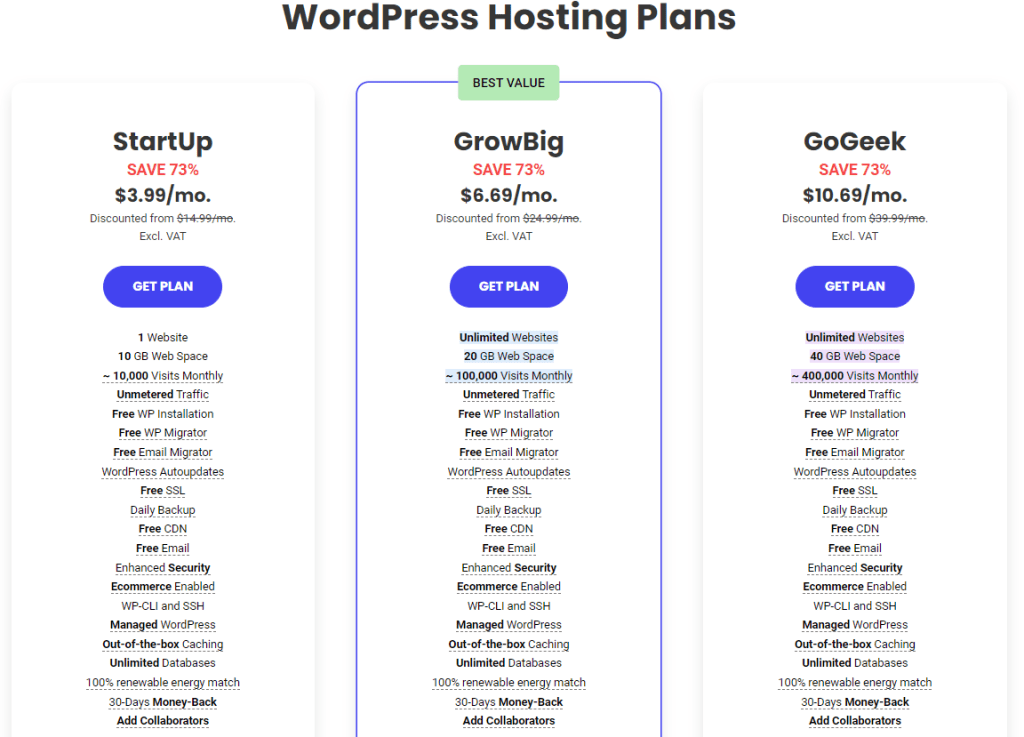
Why it suits your business: Siteground is a good option for businesses that want reliable hosting solutions with excellent customer support. Its hosting solutions are optimized for WordPress, making it a good choice for businesses that use this platform. Additionally, its range of features helps businesses optimize their website’s performance and improve their search engine rankings.
HostPapa is a web hosting platform that offers a range of hosting solutions, including shared hosting, WordPress hosting, and VPS hosting. It is known for its user-friendly interface, fast load times, and excellent customer support.
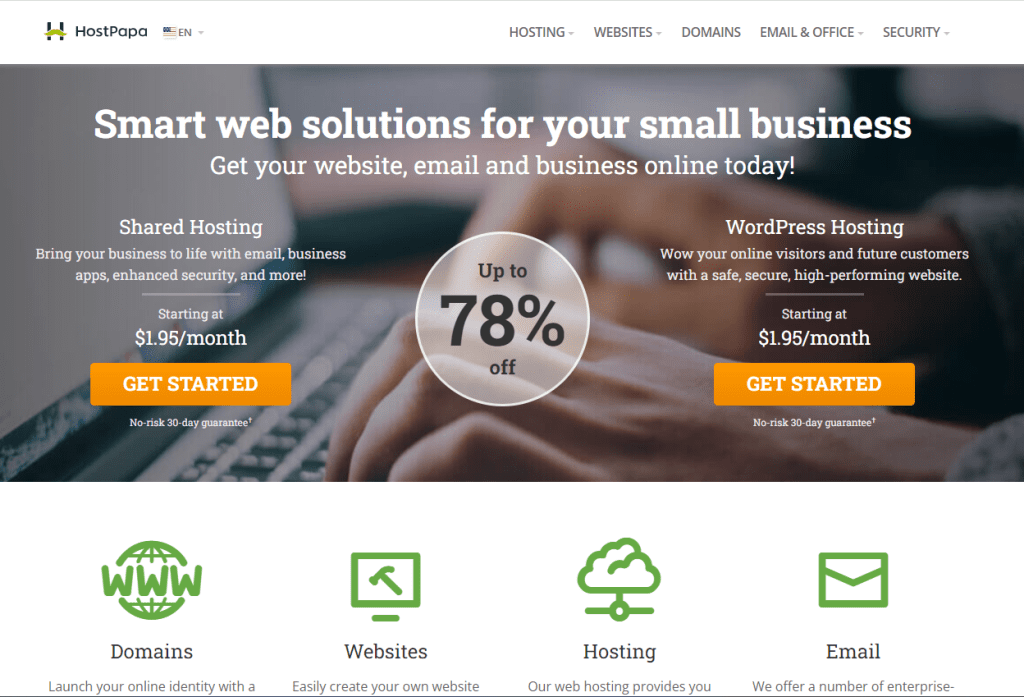
Benefits: HostPapa provides businesses with a user-friendly interface, fast load times, and excellent customer support. Its hosting solutions are optimized for WordPress, making it a good choice for businesses that use this platform. Additionally, HostPapa offers a range of features to help businesses optimize their website’s performance and improve their search engine rankings.
Pricing plan: HostPapa offers a range of pricing plans, starting at $3.95 per month for its basic plan. Higher-tier plans offer additional features and increased server resources, with prices scaling accordingly.
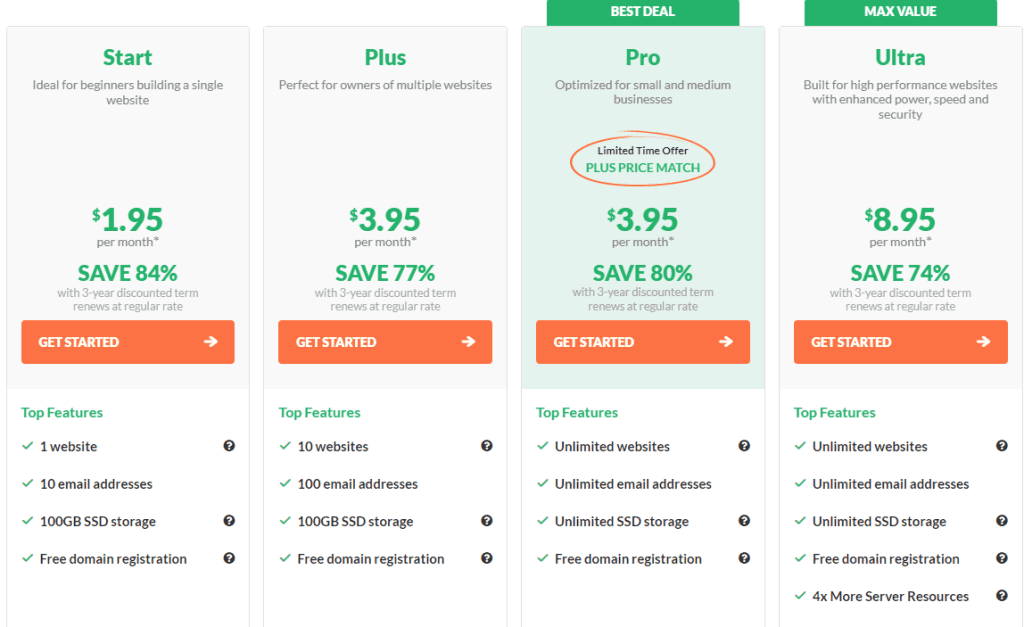
Why it suits your business: HostPapa is a good option for businesses that want reliable hosting solutions with a user-friendly interface and excellent customer support. Its hosting solutions are optimized for WordPress, making it a good choice for businesses that use this platform. Additionally, its range of features helps businesses optimize their website’s performance and improve their search engine rankings.
Dreamhost is a web hosting platform that offers a range of hosting solutions, including shared hosting, WordPress hosting, and cloud hosting. It is known for its fast load times, high levels of security, and commitment to privacy.

Benefits: Dreamhost provides businesses with fast load times, high levels of security, and a commitment to privacy. Its hosting solutions are optimized for WordPress, making it a good choice for businesses that use this platform. Additionally, Dreamhost offers a range of features to help businesses optimize their website’s performance and improve their search engine rankings.
Pricing plan: Dreamhost offers a range of pricing plans, starting at $2.59 per month for its basic plan. Higher-tier plans offer additional features and increased server resources, with prices scaling accordingly.

Why it suits your business: Dreamhost is a good option for businesses that want hosting solutions with a focus on security and privacy. Its hosting solutions are optimized for WordPress, making it a good choice for businesses that use this platform. Additionally, its range of features helps businesses optimize their website’s performance and improve their search engine rankings.
Web hosting is a service that allows individuals and organizations to make their websites accessible on the Internet. Usually, web hosting companies provide the necessary technology, infrastructure, and resources needed to store and serve website files, such as HTML, CSS, JavaScript, images, and other media.
Basically, when you sign up for a web hosting plan, you are renting space on the server and the server is responsible for storing your website’s files and making them available for visitors when they access your domain name through their web browsers. The web hosting provider ensures that the server is running smoothly, is secure, and has the required resources to handle the traffic your website receives.
There are several types of web hosting available, each designed to suit different needs and requirements. Here are some of the most common types:
Domain and hosting are two essential components of creating and maintaining a website, but they serve different purposes:
Domain: A domain, or domain name, is the unique web address that people use to find your website on the internet, like “example.com.” It acts as your website’s online identity and allows users to access your site easily. To own a domain, you need to register it with a domain registrar, typically for an annual fee. The domain is then yours as long as you keep renewing the registration.
Hosting: Web hosting refers to the service that provides storage space and resources on a server where your website’s files, content, and data are stored. This allows your website to be accessible on the internet. Hosting providers offer various types of hosting plans, such as shared, VPS, dedicated, and cloud hosting, to cater to different website needs and budgets.
In summary, a domain is your website’s unique address on the internet, while hosting is the service that stores and powers your website so it can be accessed online. To have a functioning website, you need both a domain name and a hosting plan.
In the context of web services, the terms “server” and “host” are often used interchangeably, but they refer to different concepts:
Server: A server is a physical or virtual machine that stores, processes, and delivers data or applications over a network, such as the Internet. In the case of web servers, they store and manage websites’ files, content, and data, and handle requests from users’ browsers to display web pages. Servers can run various software, including server operating systems (e.g., Linux, Windows Server) and server software (e.g., Apache, Nginx, IIS).
Host: A host, or web host, refers to a company that provides server resources, infrastructure, and services to store, manage, and deliver websites on the Internet. Web hosts offer different types of hosting plans to cater to various website needs and budgets, such as shared, VPS, dedicated, and cloud hosting.
In summary, a server is a physical or virtual machine that stores and manages website data, while a host is a company that provides the server resources, infrastructure, and services to make websites accessible on the internet.
Shared hosting is a type of web hosting service where multiple websites share the resources of a single server. It is an affordable and beginner-friendly option for hosting websites, making it popular among small businesses, bloggers, and personal websites with low to moderate traffic.
In shared hosting, the server’s resources, such as CPU, RAM, and storage, are divided among all the websites hosted on it. Each website typically has a limited allocation of resources to prevent a single site from consuming too much and affecting the performance of others.
Cost-effective: Shared hosting is usually the most affordable hosting option since the server’s cost and maintenance are distributed among multiple users.
Easy to set up and manage: Most shared hosting providers offer easy-to-use control panels and tools for website management, making it suitable for beginners with little technical knowledge.
Pre-configured server settings: The hosting provider takes care of server configuration, security updates, and maintenance, allowing users to focus on creating and managing their websites.
Limited resources: Since resources are shared among multiple websites, high-traffic or resource-intensive sites might experience reduced performance or slow load times.
Less control and customization: Shared hosting offers limited customization options and control over server settings compared to VPS or dedicated hosting.
Potential security concerns: If a website on the shared server gets compromised, it might pose a risk to other sites on the same server.
In summary, shared hosting is an economical and user-friendly option for hosting small websites with low to moderate traffic, but it comes with limitations in resources, control, and potential security risks.
VPS (Virtual Private Server) hosting is a type of web hosting service that provides users with a virtualized server environment, offering more resources and control compared to shared hosting. It is suitable for growing websites with higher traffic, online businesses, and users who require more customization and control over their hosting environment.
In VPS hosting, a physical server is divided into multiple isolated virtual servers using virtualization technology. Each virtual server has its own dedicated resources, such as CPU, RAM, and storage, which are not shared with other users. This ensures better performance and stability, as the actions of other users on the same physical server won’t affect your site.
Scalability: VPS hosting allows you to easily scale your resources as your website grows, ensuring consistent performance even with increased traffic.
Greater control and customization: You have more control over your server environment, including the ability to install custom software, configure server settings, and choose your preferred operating system.
Improved performance and stability: Since resources are dedicated and not shared with other users, your website’s performance and stability are less likely to be affected by other sites on the same physical server.
Higher cost: VPS hosting is more expensive than shared hosting due to the increased resources and control provided.
More technical knowledge required: Managing a VPS may require more technical knowledge, as you’ll need to handle server configuration, software installations, and updates.
Limited resources compared to dedicated hosting: Although VPS hosting offers dedicated resources, it may still have limitations compared to dedicated hosting, especially when it comes to high-traffic, resource-intensive websites. In summary, VPS hosting is a step up from shared hosting, providing better performance, scalability, and control over your server environment. However, it comes with a higher cost and may require more technical expertise to manage effectively.
Dedicated hosting is a type of web hosting service where an entire physical server is allocated solely to a single user or website. Unlike shared or VPS hosting, where resources are divided among multiple users, dedicated hosting provides the highest level of resources, control, and customization for your website.
Dedicated hosting is ideal for large websites with high traffic, resource-intensive applications, and businesses that require maximum performance and control over their hosting environment.
Maximum resources and performance: With an entire server dedicated to your website, you’ll have access to all the server’s resources, such as CPU, RAM, and storage, ensuring the best possible performance.
Complete control and customization: You have full control over the server environment, including the choice of the operating system, hardware configuration, and software installations, allowing for greater flexibility and customization.
Enhanced security and isolation: As your website is the only one hosted on the server, there’s no risk of being affected by other users’ actions, providing a more secure and isolated hosting environment.
Higher cost: Dedicated hosting is the most expensive hosting option due to the exclusive use of an entire server and its resources.
Advanced technical knowledge required: Managing a dedicated server requires more technical expertise, as you’ll need to handle server configuration, maintenance, software installations, and updates.
Responsibility for server management: You’ll be responsible for managing and maintaining the server, including hardware and software updates, security patches, and troubleshooting any issues that may arise.
In summary, dedicated hosting offers the highest level of resources, control, and customization, making it ideal for large websites and businesses with demanding hosting needs. However, it comes with a higher cost and requires advanced technical knowledge to manage effectively.
Cloud hosting is a type of web hosting service that utilizes a network of interconnected virtual servers to host websites and applications. Instead of relying on a single physical server, as in traditional hosting services, cloud hosting leverages multiple servers across a distributed network, providing greater flexibility, scalability, and reliability.
In cloud hosting, resources such as CPU, RAM, and storage are pooled from multiple virtual servers and allocated to your website as needed. This allows your site to easily scale resources up or down based on demand, ensuring consistent performance even during traffic spikes or fluctuations.
Scalability: Cloud hosting allows you to easily scale resources up or down based on your website’s needs, ensuring consistent performance during periods of high or low traffic.
Pay-as-you-go pricing: With cloud hosting, you generally pay only for the resources you use, making it a cost-effective option for businesses with fluctuating resource requirements.
Improved reliability and uptime: By distributing resources across a network of servers, cloud hosting reduces the risk of downtime due to hardware failure or server issues, ensuring better reliability and uptime for your website.
Automatic backups and disaster recovery: Cloud hosting providers often include automatic backups and disaster recovery solutions, providing additional protection for your website’s data and ensuring business continuity.
Potentially higher costs: While cloud hosting offers pay-as-you-go pricing, costs can still be higher than traditional hosting services, particularly for websites with consistently high resource demands.
Limited control and customization: Cloud hosting may not offer the same level of control and customization as dedicated hosting, as you’re sharing resources with other users on the same network.
Security concerns: Storing data on a network of servers can raise security concerns, particularly for sensitive or regulated data. However, reputable cloud hosting providers invest heavily in security measures to protect their users’ data.
In summary, cloud hosting provides a scalable, flexible, and reliable hosting solution, making it ideal for growing websites and businesses with fluctuating resource needs. However, it may come with potentially higher costs and limited control compared to dedicated hosting.
When choosing a web hosting provider, there are several key factors to consider, to ensure you find the right fit for your website and business needs. Here are some important aspects to evaluate:
Reliability and uptime: A reliable hosting provider should offer at least 99.9% uptime, minimizing the risk of your website being inaccessible due to server issues or maintenance. Check for uptime guarantees and read reviews to assess the provider’s track record.
Performance and speed: The performance of your website directly affects user experience and search engine rankings. Consider the hosting provider’s server locations, which can impact site speed, and look for providers that use SSD storage and offer content delivery network (CDN) integration.
Scalability and flexibility: Choose a hosting provider that allows you to easily upgrade or downgrade your hosting plan based on your needs. This ensures your website can grow with your business without unnecessary disruptions or migrations.
Pricing and features: Compare the pricing and features of different hosting plans to find one that fits your budget and meets your requirements. Be sure to consider both initial and renewal prices, as promotional rates may increase upon renewal.
Customer support: Responsive and knowledgeable customer support is crucial, especially if you’re not an expert in web hosting. Look for providers that offer 24/7 support via multiple channels, such as phone, live chat, and email.
Security: Assess the security measures offered by the hosting provider, including SSL certificates, firewalls, DDoS protection, and regular backups. If you’re handling sensitive data, ensure the provider is compliant with relevant regulations and data protection standards.
Control panel and user interface: A user-friendly control panel and interface make it easier to manage your website, even with limited technical expertise. Look for providers that offer popular control panels like cPanel or Plesk.
Additional services: Some hosting providers offer additional services, such as website builders, email hosting, and domain registration. Consider whether these services are important to you and if they’re included in the hosting plan.
Customer reviews and reputation: Research the hosting provider’s reputation by reading customer reviews and testimonials. This can give you valuable insights into the provider’s reliability, performance, and customer support.
By taking these factors into account, you can make an informed decision and choose a web hosting provider that best meets your website’s needs and ensures a smooth, secure, and high-performing online presence.
Bandwidth, in the context of web hosting and internet usage, refers to the amount of data that can be transferred between a website and its users over a specific period of time. It is usually measured in bits per second (bps), kilobits per second (Kbps), megabits per second (Mbps), or gigabits per second (Gbps).
When a user visits a website or downloads a file, data is transferred from the web server hosting the site to the user’s device. The larger the file sizes and the more users accessing the site simultaneously, the more bandwidth is consumed.
Bandwidth affects the speed and performance of a website. If a site has insufficient bandwidth to handle its traffic, users may experience slow loading times, buffering, or even an inability to access the site at all. Web hosting providers typically offer plans with different bandwidth limits to accommodate the varying needs of websites, from small personal blogs to large e-commerce platforms. It’s important to choose a hosting plan with enough bandwidth to ensure a smooth and fast user experience for your website’s visitors.
A domain name is a unique web address that allows users to find and access your website on the internet. It serves as an easy-to-remember, human-readable alternative to the numerical IP addresses that computers use to identify web servers.
A domain name consists of two main parts: the top-level domain (TLD) and the second-level domain (SLD). The TLD is the suffix, such as .com, .org, or .net, while the SLD is the name you choose for your website, such as “example” in example.com.
To register a domain name, you need to use a domain registrar, which is an organization or company accredited by the Internet Corporation for Assigned Names and Numbers (ICANN) or a national country code top-level domain (ccTLD) authority. Once you register a domain name, you’ll need to renew it periodically, typically on an annual basis, to retain ownership.
Domain names are crucial for branding and creating an online presence since they help visitors easily find and remember your website. Choosing a domain name that is relevant, memorable, and easy to spell can help you establish a strong online identity and attract more visitors to your site.
WordPress is not a web host itself; it is a popular content management system (CMS) that allows you to create, manage, and customize websites easily. However, there are two main flavors of WordPress: WordPress.com and WordPress.org, which can create some confusion when discussing web hosting.
WordPress.com is a hosted platform where you can create a website with a more hands-off approach. In this case, WordPress.com takes care of the web hosting for you, providing a subdomain (e.g., yoursite.wordpress.com) and limited customization options in their free plan. They also offer paid plans that allow you to use a custom domain and access more features.
On the other hand, WordPress.org is a self-hosted CMS, meaning you’ll need to find a separate web hosting provider to host your website. With this option, you’ll have more control over your website, including the ability to install custom themes and plugins and use a custom domain name.
So, while WordPress itself is not a web host, WordPress.com does offer web hosting as part of its service, whereas WordPress.org requires you to find your own web hosting provider to host your WordPress-powered website.
“Localhost” is a term used in computer networking to refer to the current device being used to access or run a network service. In other words, it represents the device you are currently using, whether it’s a computer, laptop, or smartphone. Localhost is typically used when you’re developing or testing web applications, software, or services on your own device before deploying them to a live server.
Technically, localhost is associated with the IP address 127.0.0.1 for IPv4 or::1 for IPv6, which is also known as the loopback address. When you access a network service on your device using the loopback address, the network traffic doesn’t leave your device and instead “loops back” to itself.
For example, when setting up a local web server for development purposes, you might access your locally hosted website by typing “http://localhost” or “http://127.0.0.1” into your web browser’s address bar. This allows you to view and interact with your website as if it were hosted on a remote server but without the need for an internet connection or external hosting service.
Yes, Google offers a web hosting solution called Google Cloud Hosting, which is part of the Google Cloud Platform (GCP). GCP is a suite of cloud computing services that allows you to host, build, and manage websites, applications, and data storage.
Google Cloud Hosting offers several options for hosting your website, such as:
Google App Engine: A fully managed platform for building and deploying web applications and services. It supports several programming languages, like Python, Java, Node.js, and more. App Engine automatically scales resources based on traffic, ensuring your website can handle fluctuations in visitors without any manual intervention.
Google Compute Engine: A scalable virtual machine service that lets you create and run custom virtual machines. This option offers more control and flexibility compared to App Engine, as you can configure the VMs to meet your specific hosting requirements.
Google Firebase Hosting: A hosting service specifically designed for web and mobile app development. Firebase Hosting is great for single-page apps, progressive web apps, and static websites. It provides features like global CDN, SSL certificates, and custom domain support.
To host your website on Google Cloud, you’ll need to sign up for a Google Cloud Platform account and choose the appropriate hosting option based on your needs. Keep in mind that Google Cloud Hosting is a paid service, and costs can vary depending on the resources and services you use. However, Google does offer a free tier with limited resources, which can be a good starting point for small projects and websites.
Yes, you can pay someone to maintain your hosting. There are various options available to help you manage your hosting effectively, depending on your needs and budget. Here are some common ways to have someone maintain your hosting:
Managed hosting services: Many hosting providers offer managed hosting plans, where they take care of server maintenance, security, updates, and performance optimization on your behalf. Managed hosting services are often available for different types of hosting, including shared, VPS, dedicated, and cloud hosting. Managed WordPress hosting is a popular example of this service.
Web development or hosting management companies: You can hire a web development or hosting management company to handle your hosting maintenance tasks. These companies can provide services like server monitoring, security updates, website backups, and performance optimization. Make sure to research and compare different companies to find the one that best meets your needs and budget.
Freelancers or consultants: You can also hire a freelance web developer, system administrator, or IT consultant with experience in hosting management. They can help you with server maintenance, updates, and other hosting-related tasks on an as-needed basis. Platforms like Upwork or Freelancer can help you find qualified professionals to help manage your hosting.
SiteLock is a website security service that offers features like malware scanning, vulnerability detection, and automated malware removal. While having SiteLock or a similar website security service can be beneficial, it’s not an absolute necessity for every website. The decision to use SiteLock depends on several factors, including the type of website you have, your budget, and your overall approach to website security.
Here are some considerations to help you decide if SiteLock is right for you:
Type of website: If you have an e-commerce website or a website that handles sensitive user information, investing in additional security measures like SiteLock can be a good idea to protect your users and your business’s reputation.
Existing security measures: Some hosting providers already include basic security features, such as SSL certificates or automated backups, in their hosting plans. If your hosting plan already includes some security features, you may want to evaluate if SiteLock provides additional benefits that justify the cost.
Budget: SiteLock comes at an additional cost, so you need to determine if the investment is worth it based on your website’s specific security requirements and your budget.
Technical expertise: If you’re not comfortable handling website security on your own or don’t have the time to do so, SiteLock can be a helpful automated solution that takes care of security issues with minimal input from you.
Ultimately, the choice to use SiteLock or a similar website security service depends on your individual needs and circumstances. It’s essential to prioritize website security, but you don’t necessarily need SiteLock if you have a solid security plan in place or if your hosting provider already offers robust security features. Consider your website’s unique security requirements and weigh the benefits and costs of adding SiteLock to your security strategy.
Domain privacy is worth considering, as it offers several benefits that can outweigh the cost for many website owners. Here’s a more detailed analysis of its advantages:
Protects personal information: Without domain privacy, your personal details (name, email address, phone number, and physical address) are publicly accessible in the WHOIS database. Domain privacy helps protect your personal information by replacing it with the contact information of a proxy service.
Reduces spam and unwanted solicitations: When your personal information is publicly available, it’s easier for spammers and telemarketers to target you with unwanted emails and phone calls. Domain privacy can help reduce the amount of spam you receive.
Prevents domain hijacking: Domain privacy makes it more difficult for cybercriminals to hijack your domain by hiding your personal information, which they could potentially use to impersonate you or gain unauthorized access to your domain account.
Enhances your professional image: For businesses, domain privacy can help maintain a professional image by ensuring that only relevant contact information is available to the public.
The cost of domain privacy varies depending on the domain registrar, but it is generally an affordable annual fee. If protecting your personal information, reducing spam, and enhancing your professional image are important to you, then domain privacy is worth the cost. However, if you’re on a tight budget and these concerns are not a top priority, you might choose to forgo it.
The cost of hosting a website for a year can vary widely, depending on the type of hosting plan, the provider, and any additional features or services you choose. Here’s a general overview of what you can expect from each type of hosting:
Shared hosting: This is the most affordable option and is suitable for small websites or beginners. Annual costs can range from as low as $15 to $120 per year, depending on the provider and the plan features.
Virtual Private Server (VPS) hosting: VPS hosting offers more resources and control compared to shared hosting. Annual costs for VPS hosting can range from around $100 to over $1,000 per year, depending on the resources allocated and the level of management provided by the hosting company.
Dedicated server hosting: Dedicated hosting is more expensive and provides the most control and resources. Annual costs for dedicated hosting can range from around $1,000 to over $5,000 per year, depending on the server specifications and the level of management provided by the hosting company.
Cloud hosting: Cloud hosting is a flexible and scalable option, with costs based on the resources you use. Annual costs for cloud hosting can range from around $100 to several thousand dollars, depending on your resource usage and the provider’s pricing model.
Managed hosting: Managed hosting plans, such as managed WordPress hosting, include additional services like security, updates, and performance optimization. Annual costs for managed hosting can range from around $100 to over $1,000 per year, depending on the provider and the level of management included.
Please note that these are rough estimates, and the actual costs can vary significantly based on the specific hosting provider, plan features, and any add-ons or services you choose, such as domain registration, SSL certificates, and website backups.
Yes, you can host multiple websites on one hosting account, provided that your hosting plan supports it. Many web hosting providers offer plans that allow you to host more than one website on a single account. These plans are sometimes referred to as “multi-domain” or “add-on domain” hosting plans.
When you host multiple websites on one account, each website will have its own unique domain name and can function independently from the others. The websites will share the same server resources, such as storage, bandwidth, and processing power, allocated to your hosting account.
However, it’s important to note that hosting multiple websites on a single account may not be suitable for all situations. If one of the websites experiences a significant increase in traffic or requires more resources, it could impact the performance of the other websites on the same account. In such cases, upgrading to a more advanced hosting plan, like a VPS or dedicated server, might be a better option.
Before hosting multiple websites on one account, check your hosting provider’s terms and conditions and ensure that your plan supports the number of websites you intend to host.